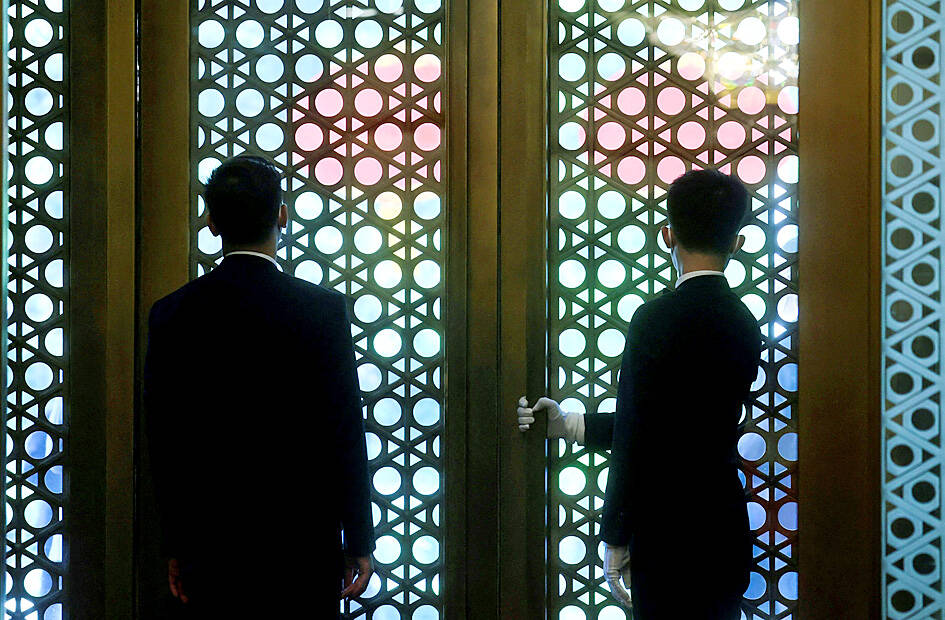For more than 40 years, a landmark agreement between the US and China has yielded cooperation across a range of scientific and technical fields, a powerful sign that the rivals could set aside their disputes and work together.
Now with bilateral relations in their worst state in decades, a debate is under way within the US government about whether to let the US-China Science and Technology Agreement (STA) expire later this year, three officials familiar with the discussions said.
With US Secretary of State Antony Blinken in Beijing on the first visit by a secretary of state in five years and expectations low for any bilateral breakthrough, the debate over the oldest US-China bilateral cooperation accord mirrors a bigger question dividing policymakers: do the benefits to the US of engaging with China outweigh the risk of empowering a competitor who might play by different rules?

Photo: AFP
The agreement, signed when Beijing and Washington established diplomatic ties in 1979 and renewed about every five years since, has been hailed as a stabilizing force for the countries’ relations, with collaboration in areas from atmospheric and agricultural science to basic research in physics and chemistry.
It laid the foundation for a boom in academic and commercial exchanges.
Those exchanges helped China grow into a technology and military powerhouse, but concerns about Beijing’s theft of US scientific and commercial achievements have prompted questions about whether the agreement — set to expire on Aug. 27 — should continue.
Proponents of renewing the STA argue that ending it would stifle academic and commercial cooperation.
While the dominant US view appears to be in favor of renewal, a growing contingent of officials and lawmakers believe cooperating on science and technology makes less sense given competition between the countries, said the officials, speaking on condition of anonymity due to the sensitivity of the issue.
“Extending the Science and Technology Agreement between the US and China would only further jeopardize our research and intellectual property,” said US Representative Mike Gallagher.
The US Department of State declined to comment on “internal deliberations on negotiations.”
China’s embassy in Washington said that Chinese officials had approached the US a year ago to talk about the deal, which it said formed the basis for 40 years of “fruitful” cooperation.
“As far as we know, the US side is still conducting an internal review on the renewal of the agreement,” embassy spokesman Liu Pengyu (劉鵬宇) said, adding that both sides could adjust the original deal.
Inside the US government, including the State Department, there are competing views about whether to renew the pact, let it expire or renegotiate to add safeguards against industrial espionage and require reciprocity in data exchanges, the officials said.
Given the state of US-China ties, trying to renegotiate could derail the agreement, they said.
US businesses have long complained about Chinese government policies that require technology transfer, and experts warn about state-sponsored theft of everything from Monsanto crop seeds to data about NASA’s space shuttle designs.
“Technology will be the cutting-edge arena of global competition in the period ahead in the way nuclear missiles were the defining feature of the Cold War,” US National Security Council Indo-Pacific Coordinator Kurt Campbell told a forum this month, adding that the US “will not cede the high ground.”
Proponents of renewing the deal say that without it, the US would lose valuable insight into China’s technical advances.
“China friend or China foe, the US needs access to China to understand what’s happening on the ground,” said Denis Simon, a professor at the University of North Carolina at Chapel Hill who studies technology strategy in China, adding that it was important for the US to negotiate a fundamentally new agreement.
“The advocates for renewal are trying to keep this [issue] a little bit under the radar because they don’t want the China bashers to get a piece of this and try to rip it apart,” he said.
Anna Puglisi, a former US counterintelligence official focused on East Asia and now a senior fellow at Georgetown University’s Center for Security and Emerging Technology, said that science and technology cooperation had at one time been the “feel good” part of relations, but that has changed.
She said there are questions about what renewed cooperation could achieve at a time when China’s national security laws now cover the export of data and the country is taking steps to limit foreign access to its domestic academic databases.
“There has to be transparency and there has to be reciprocity,” Puglisi said. “And the US government needs to do a full accounting of what have we gotten out of this besides a couple of meetings.”

MONEY GRAB: People were rushing to collect bills scattered on the ground after the plane transporting money crashed, which an official said hindered rescue efforts A cargo plane carrying money on Friday crashed near Bolivia’s capital, damaging about a dozen vehicles on highway, scattering bills on the ground and leaving at least 15 people dead and others injured, an official said. Bolivian Minister of Defense Marcelo Salinas said the Hercules C-130 plane was transporting newly printed Bolivian currency when it “landed and veered off the runway” at an airport in El Alto, a city adjacent to La Paz, before ending up in a nearby field. Firefighters managed to put out the flames that engulfed the aircraft. Fire chief Pavel Tovar said at least 15 people died, but

LIKE FATHER, LIKE DAUGHTER: By showing Ju-ae’s ability to handle a weapon, the photos ‘suggest she is indeed receiving training as a successor,’ an academic said North Korea on Saturday released a rare image of leader Kim Jong-un’s teenage daughter firing a rifle at a shooting range, adding to speculation that she is being groomed as his successor. Kim’s daughter, Ju-ae, has long been seen as the next in line to rule the secretive, nuclear-armed state, and took part in a string of recent high-profile outings, including last week’s military parade marking the closing stages of North Korea’s key party congress. Pyongyang’s official Korean Central News Agency (KCNA) released a photo of Ju-ae shooting a rifle at an outdoor shooting range, peering through a rifle scope

South Korea would soon no longer be one of the few countries where Google Maps does not work properly, after its security-conscious government reversed a two-decade stance to approve the export of high-precision map data to overseas servers. The approval was made “on the condition that strict security requirements are met,” the South Korean Ministry of Land, Infrastructure and Transport said. Those conditions include blurring military and other sensitive security-related facilities, as well as restricting longitude and latitude coordinates for South Korean territory on products such as Google Maps and Google Earth, it said. The decision is expected to hurt Naver and Kakao

Gaza is rapidly running out of its limited fuel supply and stocks of food staples might become tight, officials said, after Israel blocked the entry of fuel and goods into the war-shattered territory, citing fighting with Iran. The Israeli military closed all Gaza border crossings on Saturday after announcing airstrikes on Iran carried out jointly with the US. Israeli authorities late on Monday night said that they would reopen the Kerem Shalom crossing from Israel to Gaza yesterday, for “gradual entry of humanitarian aid” into the strip, without saying how much. Israeli authorities previously said the crossings could not be operated safely during